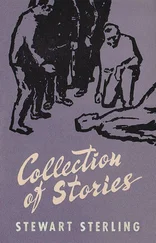She couldn’t free her hands. She only succeeded in tightening the knots in the sheeting more inextricably when she strained against them; it was that kind of material. The bed had no casters, and one foot, caught in a crack in the floor, held it fast against her attempts to drag it after her.
He’d been gone a long time. Against her will she found herself eying the china knob on the inside of the door. When it started to turn, he’d said—
And suddenly the light, given back by its glossy surface, seemed to flash, to waver. It was moving, it was going slowly around! Without his having made a sound on the stairs outside. She could feel her temples begin to pound. But the key rattle didn’t come. Instead the knob relapsed again to where it had been. With a slight rustling sound, so she knew she hadn’t been mistaken, she had actually seen it move. She stared toward it till her eyes threatened to start from their sockets, but it didn’t move again. Why didn’t he come in and get it over with? Why this exquisite additional torture? Maybe he’d heard someone coming on the stairs.
There was another agonizing wait, during which she screamed silently against the gag. There, he was coming back again. This time she could hear the furtive tread on the oil-cloth covered stairs. He must have gone down to the street again for a minute to make doubly sure no one was about.
The key hardly scraped at all, so deftly did he fit it in. And once again the china knob wheeled and sent out wavers of light. And this time the door opened — and let Death in. Death was a face she’d kissed a thousand times. Death was a hand that had stroked her hair. Death was a man whose name she had taken in place of her own.
He locked the door behind him, Death did. He said, tightlipped: “I sent it into the river. It was misty and there was no one around to see. At last I’m rid of him, that damned old man! And by the time they fish him out again, if they ever do, I’ll be far away. There’s a tanker leaves for Venezuela at midday.”
The rubber extension tube went whup! as he pulled off the nozzle of the jet. The key didn’t make any sound as he turned it, and the gas didn’t either, as it started coming in.
He dropped his eyes before hers. “Don’t look at me like that; it’s no use. I’m going through with it.”
He drew his gun and gripped it down near the bore, and then he shifted his cuff back out of the way, as a man does when he doesn’t want anything to hamper the swing of his arm. The last thing he said was “You won’t feel anything, Jackie.” That was Gil Blaine, dying inside the murderer.
Then he raised the gun butt high over his head, with a terrible intensity, so that his whole arm shook. Or maybe it was just the way she was looking at him, so that he had to use twice as much will power, to get it done.
It had gone up as high as it could; now it started to come down again. Her head seemed to be made of glass. It shattered, she could hear it shatter with the blow, and her skull seemed to rain all around her on the floor, and the blow itself exploded deafeningly in her own ears, like a shot. But without causing any pain.
Then as her eyes started spasmodically open again, it was he that was falling, his whole body, and not just his arm any more. She turned her head dazedly. The window shade was being held aside by an arm, and there was broken glass all over the floor, and Ward was out there looking into the room through a sort of saw-toothed halo where the windowpane had been, lazy smoke soft-focusing him. He reached up and did something to the catch, raised the frame, climbed through across the sill.
When he’d turned off the gas jet and freed her, she hid her face against him, still sitting there on the bedstead, and clung like that for a long time. It was a funny thing to do, with a mere detective, but still — who else had she?
“You weren’t in line with the keyhole when I squinted through it, or I would have shot the lock off then. I wasn’t sure that this was the right room, so I went through to the back yard and climbed the fire escape from there. All I had to go by was what you’d traced in the dust on the side of that car left standing out there on the road: just my name and this address. And, gee, Jackie, if you knew how close I came to never noticing it at all!”
“I didn’t think it would be seen, but it was all I had time to do. Anything could have happened. Someone’s sleeve could have brushed against it and erased it.
“He killed Burroughs early Monday morning. And he’s had him in our locked rumble seat ever since! That explains so many things in his behavior the past few days I couldn’t understand. But, oh, you’re so blind when you trust anyone! He finally dumped him, car and all, into the river just now, before he came back.”
“We’ll get it up. I was sure of him from the first, but without a body or any trace of one, our hands were tied. And then you, you pulled so much weight in his favor just by being in the picture at all, so honest and so— We all knew you couldn’t be a party to a murder.”
She lifted her head, but without trying to see past him into the room. He seemed to understand what she was trying to ask, and told her:
“He’s dead. I wasn’t very careful, I guess.”
She wondered if he’d meant to do it that way. It was better that way. Better even for Gil himself.
Ward stood her up and walked her out through the door, leaning her against him so she wouldn’t have to look at Gil lying on the floor. Outside the night seemed clean and fresh again, all evil gone from it, and the stars looked as new as though they’d never been used before. She drew a deep breath, of infinite pity but no regret.
“So this is how it ends.”
Larry didn’t even know his father was in the house until he met him coming down the stairs. It was a little after five and he’d just come in from the beach. “Hello, Dad,” he said, and held his hand out in welcome. “You didn’t tell us you were coming down from New York tonight!” Then he said: “Gee, you look white! Been working too hard?”
Larry idolized his father and worried continually about the way he kept slaving to provide for and indulge his family. Not that they weren’t comfortably well off now — but the doctor had told the elder Weeks that with that heart of his — It was only a matter of months now.
Mr. Weeks didn’t answer, nor did he take his son’s outstretched hand. Instead he sat down suddenly in the middle of the staircase and hid his face behind his own hands. “Don’t go upstairs, kid!” he groaned hollowly. “Keep away from there!”
Larry did just the opposite. His own face grown white in dread premonition, he leaped past his father and ran on up. He turned down the cottage’s short upper hallway and threw open the door at the end of it and looked in. It was the first room he’d come to. The right room.
She lay partly across the bed with her head hanging down above the floor and her light brown hair sweeping the carpet. One arm was twisted behind her back; the other one flailed out stiff and straight, reaching desperately for the help that had never come. She was his father’s wife, Larry’s stepmother. The dread he had felt on the stairs became a certainty now as he looked in. He had expected something like this sooner or later.
He turned her over, lifted her up, tried to rouse her by shaking her, by working her lower jaw back and forth with his hand. It was too late. Her eyes stared at him unblinkingly, her head rolled around like a rubber ball. Her neck had been broken. There were livid purple marks on her throat where fingers had pressed inward.
Larry let her drop back again like a rag doll, left the room and closed the door behind him. He stumbled down the hall to the head of the stairs. His father was still sitting there halfway down, his head bowed low over his knees. Larry slumped down beside him. After a while he put one hand on his father’s shoulder, then let it slip off again. “I’m with you,” he said.
Читать дальше












